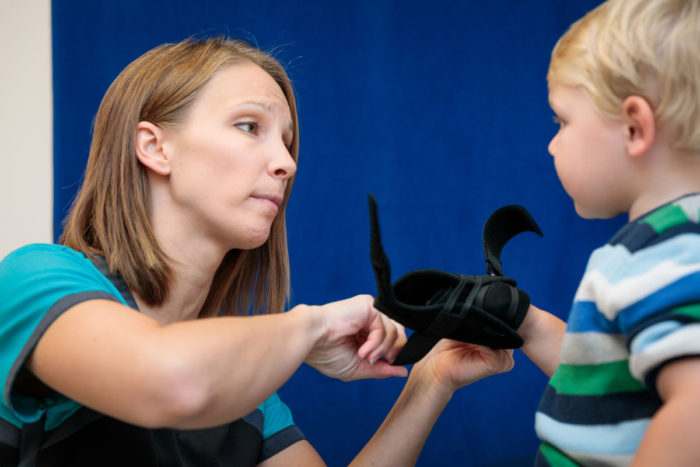School of Medicine creates its own medical assistant apprenticeship
Program's goal is to spark more interest in the field
 Matt Miller
Matt MillerMedical assistant Samantha Przehorski splints the arm of 2-year-old Henry Johnson in the Washington University pediatric orthopedic clinic at St. Louis Children's Hospital.
Medical assistants work closely with physicians but are in short supply. In an effort to spark more interest in the field and employ more medical assistants, Washington University School of Medicine in St. Louis has created its own apprenticeship program. The first federally supported medical assistant apprenticeship at a Missouri university, the program is an outgrowth of earlier medical assistant training programs at the medical school.
Medical assistants take vital signs, draw blood and give immunizations. They also schedule appointments, fill out insurance forms and arrange for laboratory services.
Tuition for those chosen for the program will be covered by grants from the city of St. Louis, St. Louis County, the state of Missouri and the federal government. The first class of 15 medical assistant apprentices, recruited from the St. Louis community, will begin the 10-week apprenticeship program this month. Current Washington University employees and members of the St. Louis community will be able to apply for a second apprenticeship program to begin in spring 2019, and Human Resources plans to offer subsequent trainings.
“This is great community outreach and helps people get a leg up,” said Tracey Faulkner, a recruitment consultant in Human Resources at Washington University. “We hope that this program will be life-changing for members of our St. Louis community, including university employees, and help us fill our medical assistant positions.”
Medical assistants normally are trained by trade schools and must pay tuition. The training program is intense and makes it difficult for students to go to school and work. Many students also find it difficult to attend school without receiving an income.
During the new training program, apprentices will be hired by the medical school as full-time employees, with benefits. The apprentices will be in class for four hours a week and work in a clinic the remaining 36 hours, all during daytime hours.
Applicants need to be at least 18 years old and have two years of experience working with patients.
Neil Perry, the Missouri state director for the U.S. Department of Labor, said the School of Medicine is the first university in Missouri to establish a medical assistant apprenticeship. “Washington University should be commended for stepping up to the plate and building a talent pipeline in this area,” he said. “The university also may establish a precedent for other universities.”
Kathy Clark, a recruitment consultant at the university, said she hopes the apprenticeship program will help people like Samantha Przehorski. She graduated in April from a similar internship program at the medical school called the MA Bridge program, which has been folded into the new apprenticeship. She now works in the university’s pediatric orthopedic clinic, caring for children who have broken bones, congenital malformations and other issues.
Przehorski was working for Washington University Physicians billing services when she learned of the MA Bridge program, which required applicants to have some experience working with patients.
She had always wanted to work on the clinical side of medicine. After high school, Przehorski studied to become a licensed vocational nurse at Jefferson College in Hillsboro, Mo., but didn’t finish her training because balancing school, a full-time job and parenting her two young daughters proved too difficult.
She said the MA Bridge program prepared her to work in clinical environments, and she is grateful the program provided pay while she finished her internship. “I was able to accomplish my goal of becoming a medical assistant, despite some setbacks, and can now show my girls that I completed my training and have a great career that will benefit all of us in the future,” she said.






